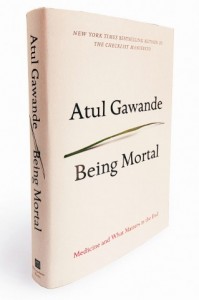Holding onto life is our most basic and natural instinct. If we have every medical treatment that can extend life at our fingertips, why not use it?
Physician Atul Gawande disagrees. In his latest book Being Mortal, he questions whether these medical interventions extend life, or simply make us miserable. It might sound counterintuitive, but he has a point.
More cancer patients live an average of 25 percent longer when they are on hospice care than those who continue chemotherapy until the bitter end.
One study shows that hospice care can actually improve and extend a patient’s life more than serious medical intervention. More cancer patients live an average of 25 percent longer when they are on hospice care than those who continue chemotherapy until the bitter end.
But why is this the case?
Gawande suggests it’s hospice’s focus on quality that counts. Nurses talk to patients about what they expect their deaths to be like, using pain medication and other treatments to simply make the patient comfortable. Gawande says we should not only accept that death is inevitable, but we should also plan for it.
In our industrialized medical system, the focus is on what new drugs can stave off death as long as possible. Doctors, pharmaceutical companies and investors pump millions of dollars into the latest drug research, trying to find that next great breakthrough.
If we have only months to live, he wants us to consider how to make those months enjoyable, rather than trying to squeeze out a few extra heartbeats.
Medical interventions certainly have their use, but Gawande wants us to think of the bigger picture. If we have only months to live, he wants us to consider how to make those months enjoyable, rather than trying to squeeze out a few extra heartbeats. What’s the point in living three days longer if you feel physically exhausted from treatments?
His idea isn’t new. In fact, it’s been in the news a lot lately. Legendary editor Diana Athill has an essay published in The Guardian of her experiences facing death head-on. She shares Gawande’s sentiments, saying, “One of the many things I like about my retirement home is the sensible practical attitude towards death that prevails here. You are asked without embarrassment whether you would rather die here or in a hospital, whether you want to be kept alive whatever happens, or would prefer a heart attack, for instance, to be allowed to take its course, and how you wish your body to be disposed of.”
Just as we would plan for college or retirement, we should plan for how we want our deaths to happen.
With Gawande’s book gaining a huge audience, and the news revolving around alternative attitudes toward death, society seems geared for a more holistic approach to the end of life. Rather than fearing death and wishing it away with unnecessary procedures, we can treat it as a natural process that requires careful planning. Just as we would plan for college or retirement, we should plan for how we want our deaths to happen.
That’s not to say that medical intervention should be completely discounted. Gawande is a physician after all, and he believes in medicine. The idea is to only use interventions when it will vastly improve quantity and quality of life.
To learn more about this topic, visit Gawande’s official website, or check out his appearance on “The Daily Show” in the video below.
For more information about other writers who believe in quality over quantity for death and dying, read this.

 Atul Gawande Says Doctors And Patients Should Stop Running From Death
Atul Gawande Says Doctors And Patients Should Stop Running From Death



 How Dare You Die Now!
How Dare You Die Now!

 “Help Me, Helen”
“Help Me, Helen”














